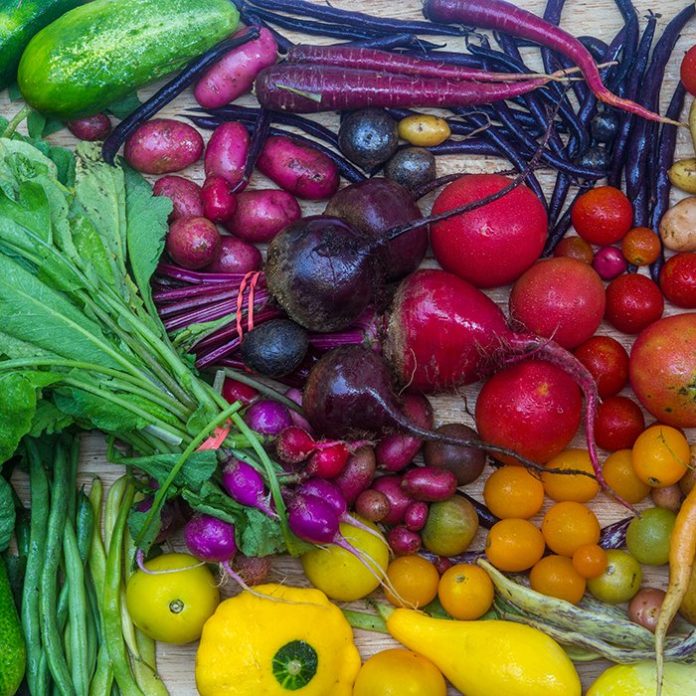A new US study has found that going vegetarian can be more effective for weight loss than following a conventional low-calorie diet.
Of the many ways to lose weight, one stands out as by far the most healthful. When you build your meals from a generous array of vegetables, fruits, whole grains, and beans that is, healthy vegetarian choices, weight loss is remarkably easy. To lose weight quickly, even when vegetarian, you’ll still need to moderate your calorie intake and exercise.
When you eat fiber rich foods, this fiber sweeps through your intestines helps in detoxifying. On the other hand, animal products contain ZERO fiber.
And along with it come major improvements in cholesterol, blood pressure, blood sugar, and many other aspects of health. The message is simple, Cut out the foods that are high in fat and devoid of fiber, and increase the foods that are low in fat and full of fiber. This low fat, vegan diet approach is safe and easy once you get the hang of it.
Being vegetarian can make putting a healthy meal plan together a little difficult. Making sure you get enough good nutrition with fewer calories is key.
Millet is a grain that dates back to the ancient Eastern Asian region. Even though it has been around for centuries, millet has received little attention as a food staple compared to other grains like rice and wheat. Millet is starting to gain more popularity because it is a source of many nutrients, low in calories and is a gluten free grain.
Millet is also considered a whole grain and eating whole grains, especially in place of refined grains, is associated with health benefits.
While eating at night won’t cause weight gain, eating a large meal that makes you exceed your daily calorie intake will. If you want to drop pounds, make lunch and breakfast your largest meals of the day, and make dinner a smaller meal.
Protein:
Plant foods have plenty of protein. Most vegetables, legumes, and grains contain this amount or more. Excellent protein sources include beans or lentils.
Calcium:
Plant-based sources of calcium are widely available. Good sources of calcium include broccoli, kale, collards, mustard greens, beans, figs, fortified orange juice, fortified cereal, and fortified, non-fat soy- or rice milks.
The research, led by Dr. Hana Kahleová, director of clinical research at the Physicians Committee for Responsible Medicine in Washington D.C., also suggests that a vegetarian diet helps to improve metabolism by reducing muscle fat.
For the research, the team recruited 74 participants, all with type 2 diabetes and randomly assigned subjects to two groups, either following a vegetarian diet or a conventional anti-diabetic diet.
The vegetarian diet included vegetables, grains, legumes, fruits and nuts, with animal products limited to a maximum of one portion of low-fat yogurt per day.
The conventional diabetic diet followed the official recommendations of the European Association for the Study of Diabetes (EASD).
All participants had their daily diets cut by 500 kilocalories per day.
The researchers used magnetic resonance imaging (MRI) to look at the adipose (fat-storage) tissue in the subjects’ thighs to see how the two different diets had affected subcutaneous fat, found under the skin, subfascial fat, on the surface of the muscles, and intramuscular fat, on the inside of the muscles.
The team found that the vegetarian diet was almost twice as effective in reducing body weight, resulting in an average loss of 6.2 kilograms compared to 3.2 kilograms for the conventional diet.
The results are important for those with type 2 diabetes as subfascial fat has been previously associated with insulin resistance, so reducing it could have a beneficial effect on glucose metabolism.
Reducing intramuscular fat could also help to improve muscle strength and mobility, particularly in older people with diabetes. The researchers also emphasized ‘the importance of exercise in weight loss programs to preserve lean mass’.
Dr. Kahleová concluded that in addition to the vegetarian diet proving most successful in their research, it “also showed that a vegetarian diet is much more effective at reducing muscle fat, thus improving metabolism.”
“This finding is important for people who are trying to lose weight, including those suffering from metabolic syndrome and (or) type 2 diabetes,” Kahleová said. “But it is also relevant to anyone who takes their weight management seriously and wants to stay lean and healthy.”
The results can be found published online in the Journal of the American College of Nutrition.
Vegetarian and other plant based diets are known for being lower in fat and sugar than meat eating diets, but the truth is, adopting a vegetarian diet is no guarantee of weight loss.
Vegetarians struggle like everyone else to avoid junk food, processed foods and other unhealthy eating habits. If you are becoming a vegetarian to lose weight you will want to follow some basic, natural weight loss strategies.



























